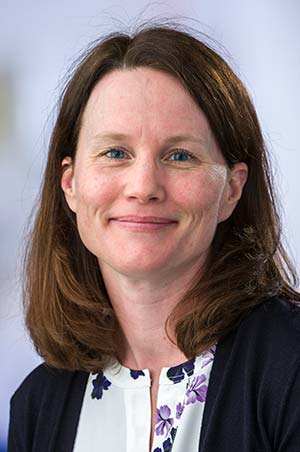Lauri M Burroughs, MD

Specialties
- Cancer and Blood Disorders Center
- Non-Malignant Transplant Program
- Pediatric Blood and Marrow Transplant Program
- Children's Title: Attending Physician, Blood and Marrow Transplantation Service
- Academic Title: Associate Professor, Department of Pediatrics, University of Washington School of Medicine
- Research Center: Ben Towne Center for Childhood Cancer and Blood Disorders Research
- On Staff Since: November 2004
"The patients and families are really what motivate me to keep striving to do better. I am always amazed at the inner strength these kids and their parents have. It is so rewarding to be a part of their lives and help them through a really difficult time. To see a child pull through and come out the other side and thrive is a wonderful feeling."
-
Biography
Lauri M. Burroughs, MD, is attending physician at Seattle Children’s Hospital, associate professor in the Division of Pediatric Hematology/Oncology at the University of Washington School of Medicine and associate professor in the Clinical Research Division and in the Pediatric Stem Cell Transplantation Center at Fred Hutchinson Cancer Center. Her research interests include hematopoietic cell transplant for patients with primary immunodeficiencies and other nonmalignant inherited disorders, and she has focused her research efforts on reducing transplant-related complications.
She is conducting several clinical trials evaluating reduced intensity or nonmyelobaltive conditioning followed by transplant for patients with nonmalignant disorders. One of the clinical trial is evaluating whether the addition of the T cell depleting agent Campath can decrease the incidence of graft versus host disease (GVHD) and improve donor chimerism following hematopoietic cell transplantation. In addition, in order to increase the number of patients with primary immunodeficiencies and other rare nonmalignant inherited diseases who may benefit from a transplant, Dr. Burroughs developed a clinical trial for patients who do not have an HLA-matched related or unrelated donor. Patients receiving a nonmyeloablative conditioning regimen will receive cyclophosphamide before and after hematopoietic cell transplantation followed by HLA-haploidentical grafts to remove alloreactive T cells with the goal of improving engraftment and decreasing GVHD. Finally, Dr. Burroughs is exploring a reduced intensity regimen that incorporates Treosulfan a Busulfan analog into the preparative regimen which in several clinical trials has been shown to be associated with significantly reduced toxicity and as a result decreased transplant related mortality following transplant. In collaboration with the Immunology group at Seattle Children's, Dr. Burroughs is evaluating how the immune system reconstitutes following transplant.
Board Certification(s)
Pediatrics
Pediatric Hematology-Oncology
Clinical Interests
Bone marrow transplantation for patients with nonmalignant and malignant diseases.
Research Description
Primary research focus is bone marrow transplantation for patients with nonmalignant diseases including primary immunodeficiency disorders, bone marrow failure syndromes, metabolic diseases, and hemoglobinopathies (sickle cell and thalassemia).
-
Related Resources
-
Faculty profile for Dr. Lauri Burroughs. Dr. Burroughs is developing safer, more effective bone marrow transplant procedures for children with noncancerous blood disorders.
-
Dr. Burrough's Bibliography (NIH)
Lauri M. Burroughs - Search Results - PubMed
-
-
Patient Testimonials
-
Awards and Honors
Loading...Award Name Award Description Awarded By Award Date {{ award.name }} {{ award.description }} {{ award.organization }} {{ award.displayDate }} No Awards and Honors found for Lauri M Burroughs, MD
-
Publications
Loading...No Publications found for Lauri M Burroughs, MD
-
Presentations
Loading...Presentation Title Event Location Date {{ presentation.title }} {{ presentation.presentedAt }} {{ presentation.location }} {{ presentation.displayDate }} No Presentations found for Lauri M Burroughs, MD
-
Research Funding
Loading...Grant Title Grantor Amount Award Date {{ funding.title }} {{ funding.grantedBy }} {{ funding.amount }} {{ funding.displayDate }} No Research Funding found for Lauri M Burroughs, MD
-
Clinical Trials and Research Studies
Loading...{{ item.st }}
No clinical trials found for Lauri M Burroughs, MD.

